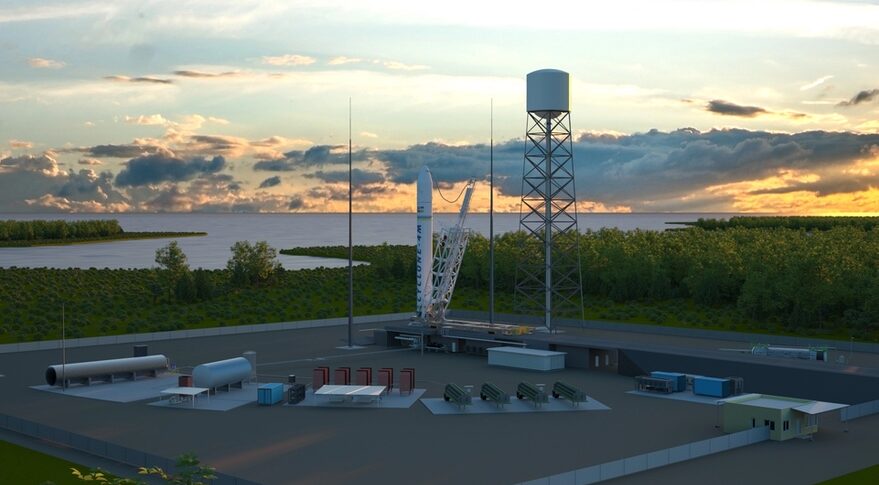
WASHINGTON — The Canadian government announced plans Jan. 20 to set up a regulatory framework to allow commercial launches from the country as part of an effort to expand Canada’s space industry.
In a briefing at the headquarters of the Canadian Space Agency (CSA) outside Montréal, officials with Transport Canada, CSA and Canadian industry announced a two-phase approach to licensing commercial launches in the country,
In an interim phase, expected to last three years, the government will review requests to conduct commercial launches on a case-by-case basis. Those applications will be reviewed to ensure they are “safe, secure and environmentally sustainable,” Transport Canada said in a statement, using existing laws and regulations.
During that interim period, Transport Canada will work with other government agencies to develop a formal licensing framework for commercial launches. That will include an interagency review process to check that proposed launches comply with domestic law and international treaties. Officials didn’t indicate if new legislation will be required to establish that framework.
“We want to position Canada as a leader in commercial space launches,” said Omar Alghabra, the minister of transport, at the event.
He and others described launch as a missing piece in the country’s overall space industry that, when established, would provide a complete range of capabilities that includes satellite manufacturing and space services. The government of the United Kingdom has made similar arguments as it sought to establish a network of spaceports in the country for launching small satellites.
“Enabling commercial launch from Canada will allow our sector to capture a share of the growing global space launch market,” said CSA President Lisa Campbell. “Space launch will increase Canada’s domestic capability and cover the full life cycle of space missions.”
“This is an important piece to have an end-to-end space sector,” said Brian Gallant, chief executive of Space Canada, an industry group. “We believe that there are Canadian companies that will be interested in launching here, but also international ones.”
“For many years, Canadian satellites have launched from sites in other countries, and it’s time for us to start launching them right here at home,” said Alghabra, who predicted that the first launches from Canada would take place during that three-year interim period.
The most prominent Canadian launch company is Maritime Launch Services (MLS), which has been working for several years to establish a spaceport in Nova Scotia that would host launches of Ukrainian-built Cyclone-4M rockets and potentially other launch vehicles. MLS finally started construction of the spaceport late last year after securing environmental and other approvals.
“Breaking ground on Spaceport Nova Scotia was a clear signal to the global space sector that Canada would soon have global launch capabilities, and satellite companies from around the world have since signaled their strong demand to launch from Nova Scotia,” Stephen Matier, chief executive of MLS, said in a statement. He said MLS has “satellite client multi-launch term sheets” but did not disclose specific contracts.
Several other Canadian companies, including C6 Launch Systems, Reaction Dynamics and SpaceRyde, have been working on smallsat launch systems that could operate from Canada or elsewhere. Those companies likely would need Canadian government approval regardless of launch location to comply with the oversight requirements of the Outer Space Treaty.
Alghabra said Transport Canada has received inquiries about launching from Canada from companies in several countries, such as Germany, Italy, the Netherlands and South Korea. He did not name any specific companies.
“We know that there’s an appetite, domestically and internationally, to launch from Canada, and today’s announcement is a strong signal to invite those who are interested to come on in to take advantage of the advantages that Canada has,” he said.
Canada has not hosted an orbital launch, although Churchill, Manitoba, was the site of sounding rocket launches from the 1950s through the 1980s. In the 1990s, a private venture proposed turning the site into a commercial spaceport, called SpacePort Canada, that would host suborbital and orbital launches, but conducted only a single sounding rocket launch.
Transport Canada has previously granted permissions for a commercial launch. In October 2004, the agency approved an application from a Canadian venture, The da Vinci Project, for two crewed launches of its balloon-born reusable suborbital vehicle from Saskatchewan. The da Vinci Project was competing for the $10 million Ansari X Prize for the first team to conduct two crewed suborbital launches to an altitude of at least 100 kilometers within two weeks.
The launches by The da Vinci Project never took place. Shortly before Transport Canada issued its approval, The da Vinci Project announced it would not be ready in time for a launch in October. Scaled Composites flew the second of two prize-qualifying missions of its SpaceShipOne vehicle on Oct. 4, 2004, to win the competition.